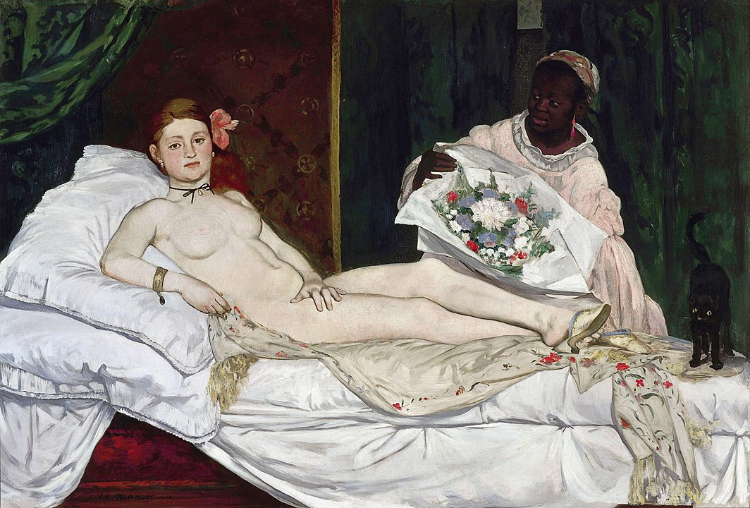Olympia by Édouard Manet

Olympia by Édouard Manet
Hard to believe, but this was the most controversial painting in France in the 1860s, supplanting Manet's previous work, Dejeuner Sur L'Herbe.
The painting was an affront to conventional wisdom at the time on both the thematic and technical fronts. The painting is clearly inspired by Titian's Venus of Urbino, but where nude subjects in the past were demure and avoided eye contact, Olympia challenges the viewer with the direct gaze of a woman.
France, and the world, would never be the same afterward.
First impressionisms
In addition to the non-traditional subject matter of the painting, Manet's style completely bucked the existing norms of The Academy. Where traditional paintings accentuated the musculature of the subjects (known in the art world as modeling), Olympia focused on basic forms and representations derived from first impressions rather than a strict adherence to realism.
Though this painting lacks the bold colors typically associated with Impressionist paintings, it shares the same emotional punch and anti-establishment tendencies as its descendants - enough so that the Impressionists who followed Manet considered him the father of the movement.
Modern Life in France
Prior to this painting, French artists adhered to very rigid themes and styles. The academy in charge of exhibiting the works believed there was an objective beauty that applied to art, and slipping outside of those bounds was artistic heresy.
Female nudes were common, but their gaze was demure, and they were often historical or mythical figures. In this painting, the setting is clearly modern, the style of the room indicates Olympia is a courtesan, and she's directly challenging the viewer/potential paramour with her stare.
Her servant in the background is also another nod to the changing demographics of France after they abolished slavery about a decade prior. The cat at the foot of the bed - in contrast to the dog representing fidelity in Titian's painting - is another none-too-subtle nod to Olympia's profession.
One can almost hear the gasps escaping from mid-19th century Paris mouths.
